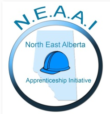About Us
The North East Alberta Apprenticeship Initiative’s purpose is to provide service and support for individuals & companies involved in the Skilled Trades.
What is NEAAI?
In response to the current and projected skilled labour shortages in Alberta, the proposed Northeast Alberta Apprentice Initiative, as coordinated by Tribal Chiefs Employment & Training Services Association (TCETSA) will create a blended distance learning environment and support system, based on existing trades’ apprenticeship curriculum, with the objective of increasing the skilled workforce in Northeast Alberta.
Where is the Focus Area?
The Initiative will focus on increasing the number of people indentured in a Trade and successfully completing Trades Technical Training to Journey person status with gainful employment in northeast Alberta.
Who Are Our Partners?
Working with post-secondary institutions, online and 3-D simulation learning technology providers, regional industry partners, federal and provincial Governments, and apprenticeship support workers, the initiative will close the gaps in the current apprenticeship system. The service will be offered to both Aboriginal and non-Aboriginal people throughout northeast Alberta
What Employment Models Where used?
Apprenticeship engagement, Employer engagement, Alberta Apprenticeship and Industry Training, post-secondary institutions, and a Steering Committee
Where Well These Activities be Carried Out?
- Local employment activities will take place at various industry sites.
- Training can be delivered through various modes: online, mobile trades training unit, site-based, 3-D simulations, and distance learning as well as training will be offered in home communities, where possible, to minimize the number of barriers encountered by this segment of the population.
- For technical training, students will attend training on campus. Blue Quills College serves the St. Paul region; Lakeland College serves the Lloydminster and Vermilion areas; Portage College serves the Lac la Biche region; Keyano College serves the Ft. McMurray region.
- Apprenticeship support will be coordinated through two sites: Bonnyville / Cold Lake and Lac la Biche / Cold Lake
